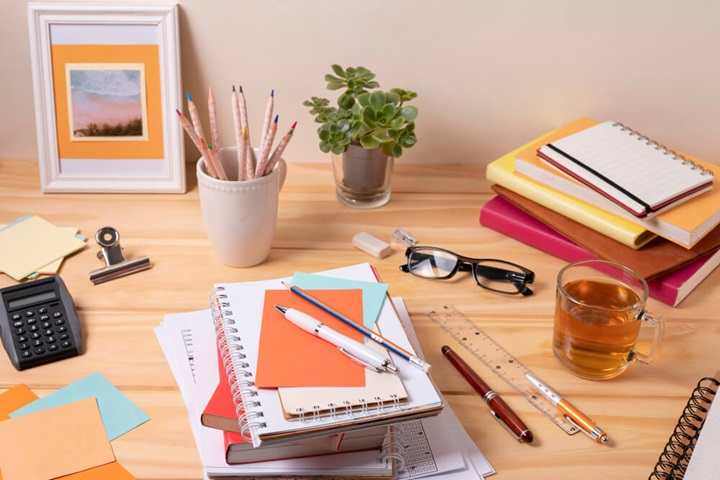Transform your study habits with the right study environment—where focus meets comfort. Discover the key to unlocking your learning potential at home.
With remote learning, it is easy for our bedrooms (or other rooms in the home) to become a classroom. However, with the right study setup, you can increase your productivity skills and focus correctly whilst not disrupting the comfort of your own home. In this article, you will learn how to create the perfect study environment at home, from minimising distractions to including the right objects to increase your productivity.
Key points:
- Identify and set up a dedicated workspace for studying.
- Learn strategies to minimise distractions and improve focus.
- Understand the impact of natural lighting and organised spaces on learning.
- Explore how recreating assessment conditions can boost memory retention.
- Discover the psychological benefits of a personalised and motivating study area.
- Why It Is Important To Have A Well-Designed Study Environment
- 12 Tips on How to Create a Great Study Environment
- 1. Decluttering
- 2. Managing Distractions
- 3. Incorporate Natural Elements
- 4. Stay Hydrated To Retain Focus
- 5. Using Colour To Aid Mood
- 6. Designate Your Study Zone
- 7. Decorate with Inspiration
- 8. Be Organised
- 9. Careful Planning
- 10. Make Notes In A Personal Journal
- 11. Maintaining Posture For Concentration
- 12. Time Management
- Choose NCC Home Learning When Studying At Home
- Minimising Distractions When Studying At Home
- FAQs
- Sources
Why It Is Important To Have A Well-Designed Study Environment
One study goal that you should set for yourself is by establishing the right study environment when studying from home.
Creating the perfect study environment at home is necessary so that you can learn effectively, no matter whether it is online home learning or doing some homework. Understanding how your surroundings affect your ability to study can drastically improve your productivity. A well-thought-out study setup is pivotal as it equips your mind to tackle academic challenges efficiently, making it less daunting and more enjoyable.
Choosing the Best Place to Study
Choosing the best place to study begins with selecting a specific area in your home that you can dedicate solely to your academic activities. This space should be free of distractions and equipped with all the necessary tools you might need, such as a comfortable chair, suitable lighting, your study materials neatly organised and at hand. This area should ideally be calm, quiet, tidy, and an ideal space for yourself for productivity.
12 Tips on How to Create a Great Study Environment

To effectively study from home, prioritise organisation. Here are 12 essential tips that you should adopt in order to create a great study environment:
1. Decluttering
A messy environment has been researched and proven to cause stress and anxiety. Therefore, when creating your perfect study environment, start by decluttering and clearing a space so that you have a clear area to learn and focus. A tidy desk, after all, reflects a tidy mind, providing you with the clarity needed to process and retain information.
Next, ensure that everything you might need during your study sessions—notebooks, textbooks, pens, and highlighters—is within reach. This reduces the time spent searching for materials, thus minimising disruptions to your study flow.
Do you need to prioritise your revision tasks throughout the week? Try our essential revision timetable so that you can customise a sheet that suits you and your schedule.
2. Managing Distractions
When studying from home, it’s crucial to minimise interruptions.
This might mean negotiating quiet hours with other household members or using noise-cancelling headphones to maintain focus. Digital distractions can also affect your concentration, so consider using apps that block social media during study hours or simply keep your devices in another room.
3. Incorporate Natural Elements
The physical environment can significantly affect your ability to focus and learn.
Natural light, for instance, not only reduces eye strain but also improves your mood and energy levels. If possible, position your study desk near a window. Additionally, incorporating natural elements, like a small plant or positioning your desk so you can view the garden, can also boost your mental energy.
This is especially great for naturalistic learners who prefer the touch of a wind breeze or the smell of fresh air to benefit their learning. Even before you start studying, and it is a sunny day, it will not hurt to let your skin absorb some vitamin D from the sunshine to kick start your day in a natural manner.
4. Stay Hydrated To Retain Focus

Keeping hydrated is crucial while studying.
Always have a glass or bottle of water within reach. This simple practice not only keeps you hydrated but also helps maintain your concentration levels high throughout your study sessions. By mimicking the conditions you might experience during an exam—where a water bottle is often allowed—you can also acclimate yourself to the testing environment, which can help reduce anxiety on the actual test day.
After all, it is recommended that you drink at least 6-8 cups or glasses of fluids a day, and even though this includes milk, sugar-free drinks, and tea and coffee, water is often your best bet since it provides the most natural benefits for your body as well.
5. Using Colour To Aid Mood
The colours surrounding you can have a profound impact on your mood and cognitive performance.
For instance, incorporating elements of blue and green can create a calming effect and improve focus, while yellow can energise and enhance memory retention.
Avoid overly vibrant colours like red in large amounts, as they might increase anxiety and distractions.
Experiment with different hues in your study environment to find what colour(s) best helps you concentrate and learn.
6. Designate Your Study Zone
It is easy for many to fall into the rabbit hole of turning your bedroom into a study environment. Instead, you should mainly commit to using your study space for academic purposes.
The psychological association your mind builds between this space and productivity will strengthen over time, making it easier to get into a study mindset as soon as you enter this area. This practice helps in maintaining a clear boundary between work and leisure, which is essential for effective home study.
7. Decorate with Inspiration
Personalise your study area with items that motivate you, such as inspirational quotes, images of your goals, or symbols of your academic aspirations.
These visual cues serve as daily reminders of your objectives and provide motivational boosts, particularly during more challenging periods.
8. Be Organised

Keep your study materials neatly arranged and easily accessible. This organisation minimises the time wasted searching for items and allows you to focus more on studying.
You could keep these in a drawer, a pencil case, or even an upcycled container if you are looking for more innovative methods to spice up your study environment.
9. Careful Planning
For those balancing family life or other responsibilities, it’s crucial to plan your study time around your personal circumstances. Whether early in the morning or late at night, identify when you can study with minimal interruptions.
This planning might involve coordinating quiet hours with family members or selecting times when distractions are least likely to occur.
Are you struggling to juggle working and studying at the same time? Try our useful guide to ease you through this often stressful period.
10. Make Notes In A Personal Journal

Keep a journal within your study area to jot down thoughts, ideas, or questions that arise during your study sessions.
This practice can help declutter your mind and improve your focus on the task at hand. A journal acts not only as a repository for fleeting thoughts but also as a tool to refine them, thereby improving your learning process.
11. Maintaining Posture For Concentration
Maintaining correct posture should be prioritised when studying from home, as it directly influences both your physical health and academic performance.
Sit in a chair that supports your lower back, with feet flat on the floor and knees at a right angle. Keep your computer screen at eye level to avoid neck strain, and ensure that your arms are parallel to the floor when typing or writing.
Regular breaks to stretch and adjust your position can also prevent muscle fatigue and discomfort. If you wish to know more, read this informative guide on how to sit properly at your desk.
12. Time Management

You may often see time management come up when setting SMART targets, and rightly so, because not prioritising how much time you have can lead you to feeling rushed, and feeling like you have no time at all.
Incorporating an alarm clock into your study setup can transform your productivity (and will be more efficient than using your phone). The Pomodoro Technique, a time management method developed by Francesco Cirillo, involves studying intensely for 25 minutes followed by a short break.
This technique helps maintain high levels of focus while preventing burnout, making it an ideal strategy for those studying from home. Set your timer and commit to this cycle to aid your concentration and efficiency.
Choose NCC Home Learning When Studying At Home
NCC Home Learning provides suitable and affordable online courses, perfect for flexible learning, and as such, you should optimise your study space effectively so that you can learn from home with limited distractions.
From GCSEs to A-Levels, RQFs and more, we offer course types for various age groups, proving that there is no age limit when it comes to online learning. Even if you are unconvinced about studying online, our guide on whether online learning is effective will help to answer any queries that you may have.
Minimising Distractions When Studying At Home
In conclusion, there are simple but easy changes that you can make to your study setup at home to ensure that you can learn effectively and boost your grade potential. From minimising distractions, to allocating enough time and setting yourself adequate breaks to embrace nature and stretch your legs, you can complete your study tasks without feeling overwhelmed. So why not give these a try today, and help yourself to learn better now.
FAQs
How will a good study space help you when studying?
A good study space can enhance focus, reduce distractions, and increase your productivity. It provides a designated area where your brain can switch to “study mode,” helping you maintain concentration over longer periods.
What type of environment is best for studying?
The best environment for studying is one that is quiet, well-lit, and free from distractions. It should be equipped with comfortable furniture, all necessary supplies, and preferably, a clean and organised space that minimises stress and mental clutter.
Why is a good study area important?
A good study area is important because it establishes a routine and physical space dedicated to studying. This consistency helps condition your mind to prepare for learning and intellectual engagement, which can improve your information retention and overall academic performance.
Sources
NHS. (2022) Water, drinks and hydration. [online] Available at: https://www.nhs.uk/live-well/eat-well/food-guidelines-and-food-labels/water-drinks-nutrition/ [accessed 16/08/24]
Divincenzo, K., (2018) How to Sit Properly At Your Desk. Work Fit. [online] Available at: https://www.work-fit.com/blog/how-to-sit-properly-at-your-desk [accessed 19/08/24]
The Pomodoro® Technique. (2009) Homepage. [online] Available at: https://www.pomodorotechnique.com/ [accessed 16/08/24]








